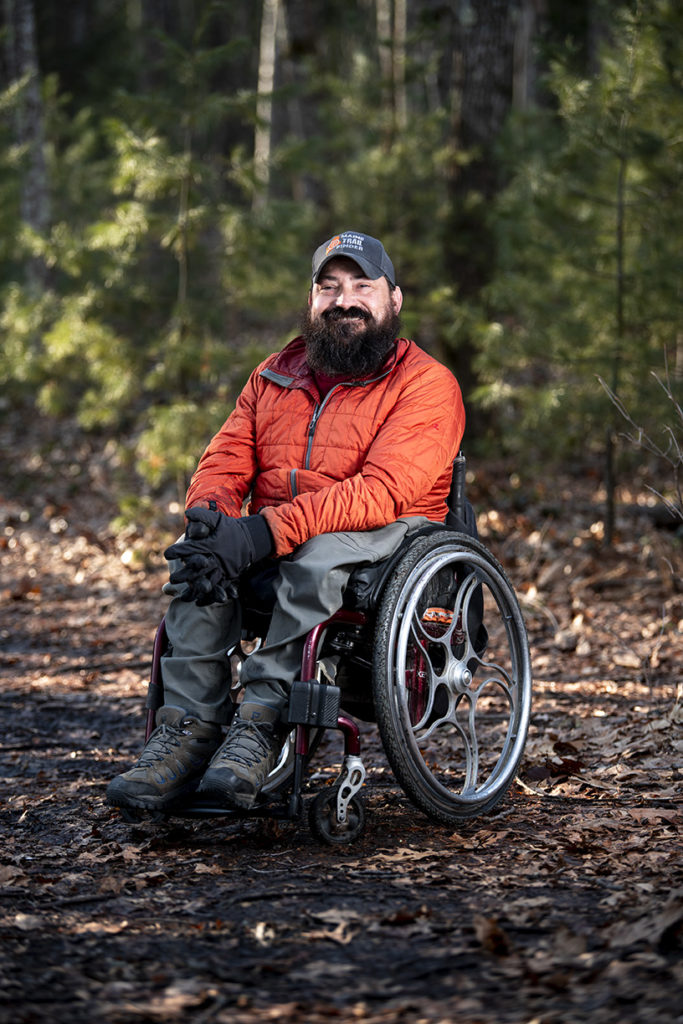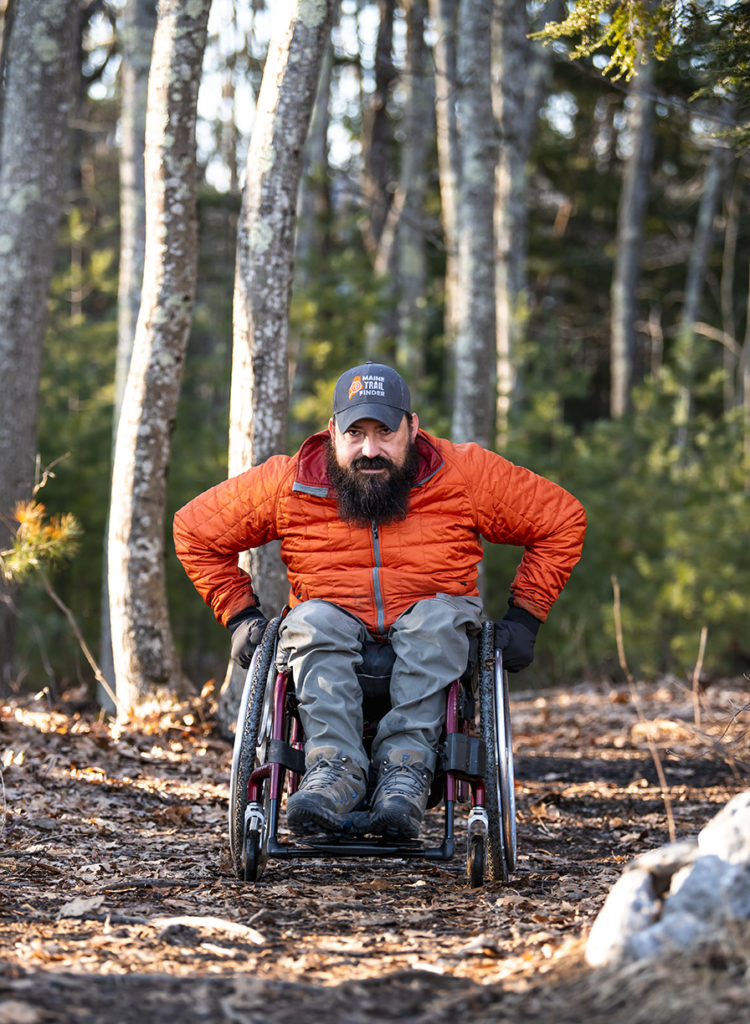Meet the Adventurer Making Maine’s Trails More Accessible
Adaptive athlete and advocate Enock Glidden is working with Maine Trail Finder to assess trails and provide tips for every type of hiker.

Enock Glidden describes himself as a professional adventurer, which he is, but his ambitious outdoor pursuits have also made him an activist and advocate for better accessibility in the outdoors. “There is no such thing as can’t,” says Glidden. “People tend to give up when things get hard, but I like it—I want to show people how they can do something.”
Born with spina bifida, the Maine native has spent much of his life breaking barriers in the world of outdoor adventure, a feat which he attributes in part to the power of community. When Glidden was 13, his junior high school gym teacher at Katahdin Junior High School, Bob Dyer, introduced him to sports. “He didn’t treat me like the kid in the wheelchair—he treated me like everyone else,” says Glidden, who lives in Bethel. “He got me into wheelchair racing, basketball, and took me skiing at Sunday River. That’s what set me on the path to realizing I could do anything I wanted to do.” Glidden took a no-holds-barred approach, not only staying active and competing throughout the years but finding a deeper love for high-risk, adrenaline-driven activities like flying planes and rock climbing.

However, it was a tragic accident that redirected him on the path of recreational climbing: his friend Nick Hall lost his life on Mount Rainier in Washington while performing a rescue. “That day, I went onto his Facebook page and looked at all the amazing pictures of the places his adventures had taken him,” explains Glidden. “I decided I wanted to see those places myself. So, I went online and found Paradox Sports to help me figure out how I was going to climb mountains.”
Paradox Sports is a Maine-based organization with a mission to provide “adaptive climbing opportunities that defy convention”—a sentiment that echoes Glidden’s personal ethos. In 2016 Glidden joined Paradox Sports’ Adaptive Climbing Initiative to help him climb Yosemite National Park’s famed El Capitan. The gargantuan 3,000-foot-tall granite peak—twice the height of the Empire State Building—is only scaled by expert climbers. Filmmakers captured Glidden’s ascent for a short, eponymous documentary, Enock.
Since then, he’s traveled around the country as a speaker and advocate for adaptive athletes, but his latest project has kept him much closer to home. Beginning last summer, Glidden has been working with Maine Trail Finder, an online resource, to assess the accessibility of trails around the state. With the title of Accessibility Ambassador, he has been writing a series of blog posts called “Enock’s Adventures” on the resource’s website.
Maine Trail Finder first reached out to the Adaptive Outdoor Education Center (AOEC), an organization that offers adaptive recreation and education programs in Carrabassett Valley and Brunswick, to collaborate on a grant for accessible trails, and they connected the trail resource with Glidden. “Enock immediately came to mind,” says Kayla Lee, AOEC’s director. “He always does a great job of sharing his perspective and experience with accessibility and also helped us start our Horizons Climbing Program, which we now offer at three gyms in Maine as well as outside during the summer.”
When visiting a location, Glidden assesses the trails, parking, bathrooms, and every feature of the property and shares his feedback directly with the property owners and land trusts to help them further improve the trails. “I always choose a trail that’s not necessarily rated as accessible but easy,” he says. “I start from there and then figure out if this could be accessible or how hard it would be to make it an accessible trail.”
Glidden describes an accessible trail as one that’s “barrier-free.” The most regular offenders that render a trail inaccessible include rocks and roots, stairs instead of a gradual switchback, and “bog bridges.” Bog bridges are logs cut in half to provide a flat, dry surface for hikers. Although well intentioned, they immediately make a trail inaccessible for wheelchairs. Glidden recommends instead building boardwalks, so the trail is user-friendly for all visitors.
“Accessibility is a vast topic. It’s not just about wheelchairs but also visually impaired people and people with sensory issues,” says Glidden. “There’s a lot to think about, and sometimes that can be a hindrance for property owners. But you just need to start. It doesn’t all have to be done now. Keep improving over time and eventually it will be good.” He recalls once encountering an older woman who was also struggling to navigate an obstacle course of gnarled roots on a trail. “It was interesting because, if those trails had been accessible for me, then they would be accessible for her and the general public,” says Glidden. “Accessibility is universal. Everyone needs an accessible accommodation at some point.”


An engaging conversationalist with the ability to effortlessly lighten the mood, Glidden has shared his stories and the importance of accessibility all over the country as a public speaker. However, he is his own breed of advocate. He doesn’t hit you over the head with heavy facts to guilt you into getting involved, nor is he over-the-top and saccharine in the way so many motivational speakers can be. Instead, he shares his message through lived experiences, often answering questions with personal anecdotes. His collaborative mindset and insatiable desire for rugged adventures make it easy to get on his side.
When I ask him about his next adventure, Glidden smiles somewhat mischievously and then shares his goal of completing a solo mountaineering mission on a challenging climbing route called Moonlight Buttress in Zion National Park. “As long as it’s an adventure,” he says, “I’ll do it.”





